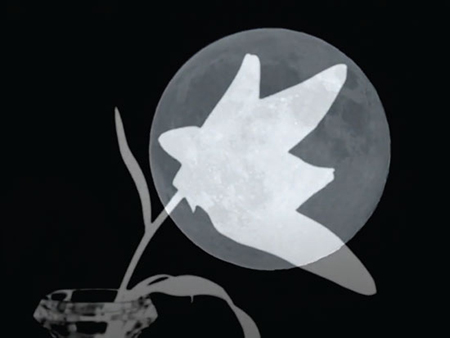 Brandi Shah, "Another Solstice," digital video, 04:18, 2021.
Brandi Shah, "Another Solstice," digital video, 04:18, 2021.
Patients are the storytellers of their own lives, and doctors taking time to listen to that story could benefit them both.
That’s the premise of a new course at the University of Alabama at Birmingham, led by Brandi Shah, M.D., MPH, a family medicine physician who specializes in adolescent and young adult health.
In its inaugural year, “Holding Space: Power of Storytelling in Medicine” is a co-enrolled, School of Medicine elective sponsored by the Department of Family and Community Medicine, through a new office Shah directs, the Office of Identity, Inclusion and Collective Conscience. The course extends beyond the measurable and procedural skills in medicine to help medical students develop a deeper understanding of and build relationships with patients and community partners through story.
Shah, who has been a lifelong creative writer and poet, says the sheer necessity of sharing stories motivates all of her work. Now, in the “Holding Space” course, those two areas intersect: Shah will have her work as a writer and digital storyteller shown publicly for the first time in the exhibition “Sawubona/Sala Kahle,” which opens Friday, Feb. 19, at Vinegar Contemporary, with a socially distant reception. Experimenting with still images, animation, photography, video editing, found media and sounds has been a liberating process in imagining how words can be enlivened in new, interpretive ways, she says.
Participants in “Holding Space” will have the opportunity to exhibit at Vinegar, April 16-May 15. This is subject to change because one critical aspect of storytelling is understanding the fluid nature of consent. The storytellers, with their students’ support, ultimately will decide at the end of the course how — and if — they want to disseminate their stories.Update: The second exhibition of digital storytelling created during Shah’s course at UAB, “Holding Space: One Entity Embracing All,” will open at Vinegar Contemporary on Saturday, April 17, with a public panel discussion from 11 a.m.-12:30 p.m. The exhibition was created by storytellers from a Birmingham gender diverse community and UAB medical students and is supported by Birmingham AIDS Outreach partners. The exhibition will be on view until May 15.
Vinegar Contemporary is a space that showcases artists who are working in emerging and experimental art forms and art that pushes the boundaries of its medium. It is co-founded, co-directed and co-curated by Melissa Yes, an employee in the UAB College of Arts and Sciences’ Department of Art and Art History and two-time UAB alumna. Visit vinegarprojects.org for more information.
In the “Holding Space” course, medical students learn to recognize patients as storytellers and experts about their own lives and amply use the one tool they can trust in any medical encounter: listening with an open heart, Shah says.
Vinegar presents “Brandi Shah: Sawubona/Sala Kahle,” Feb. 19-March 27
Opening reception 5-8 p.m. Friday, Feb. 19 701 37th St. South No. 12, Birmingham, Alabama vinegarprojects.org @vinegarprojects A socially distanced reception outdoors with fire pits and refreshments is planned. Face coverings are required. Limit four persons in gallery at a time. Vinegar will host a virtual artist’s talk with Shah and her collaborator, Celeste Amparo Pfau, 6-7 p.m. Thursday, March 18. Participants must register in advance for the event.
“With humility and radical compassion, students are expected to engage in co-learning activities individually and collectively with the storytellers, colleagues and facilitators,” Shah said. The activities focus on rapport-building, interviewing skills, self-reflection, mutual exchange of knowledge and cultivating space for sharing and documenting stories. “The experience will culminate in the students collaborating with the storyteller to create a digital story that authentically represents some aspect of the storyteller’s health journey and related lived experience,” she said. “All participants gain reproducible skills in digital and health literacy.”
“Holding Space” is more participatory and practical than traditional narrative medicine for both the provider and patient. In this first iteration of the course, community participants/storytellers self-identify along the LGBTQ+ spectrum, which offers “traditionally marginalized voices a meaningful platform that is often denied them,” Shah said.
Each year that the course operates, storytellers will be invited from similarly marginalized cohorts to tell authentic stories about their health journeys.
Combining her passions for storytelling and health justice, Shah’s vision is to create a community storytelling lab that can serve as a “third place” where people of all identities, groups, perspectives, burdens and histories can congregate, collaborate and reclaim narratives about health and resilience for catharsis, collective voice, public awareness, advocacy and social change.
“I see the exhibition of my personal work as a way to open up a space for digital storytelling to be shared and valued, to show the participants in my course what it can be like to put one’s stories out there and to create connections and collaborations for growing the Birmingham storytelling and creative community,” said Shah, who aspires to provide storytelling infrastructure for those who are most silenced and obscured in our communities.
One of the most meaningful consequences of this course is the community-building and mutual affirmation that have developed because of it, including the partnership with Vinegar and Magic City Wellness Center, which provides free space in its new building to hold the in-person sessions. This is notable for a few reasons, Shah says.
“It is an incredibly affirming space for our LGBTQ+ storytellers and provides familiarity with an entity that may be able to serve some of their needs,” Shah said. “Second, it gets the medical students out of the medical school and into a more neutral community space. And, Magic City Acceptance Center worked with us to advertise to and recruit storytellers, two of whom are participating because of those efforts. Both of these indispensable community institutions are operated under the umbrella of Birmingham AIDS Outreach.”